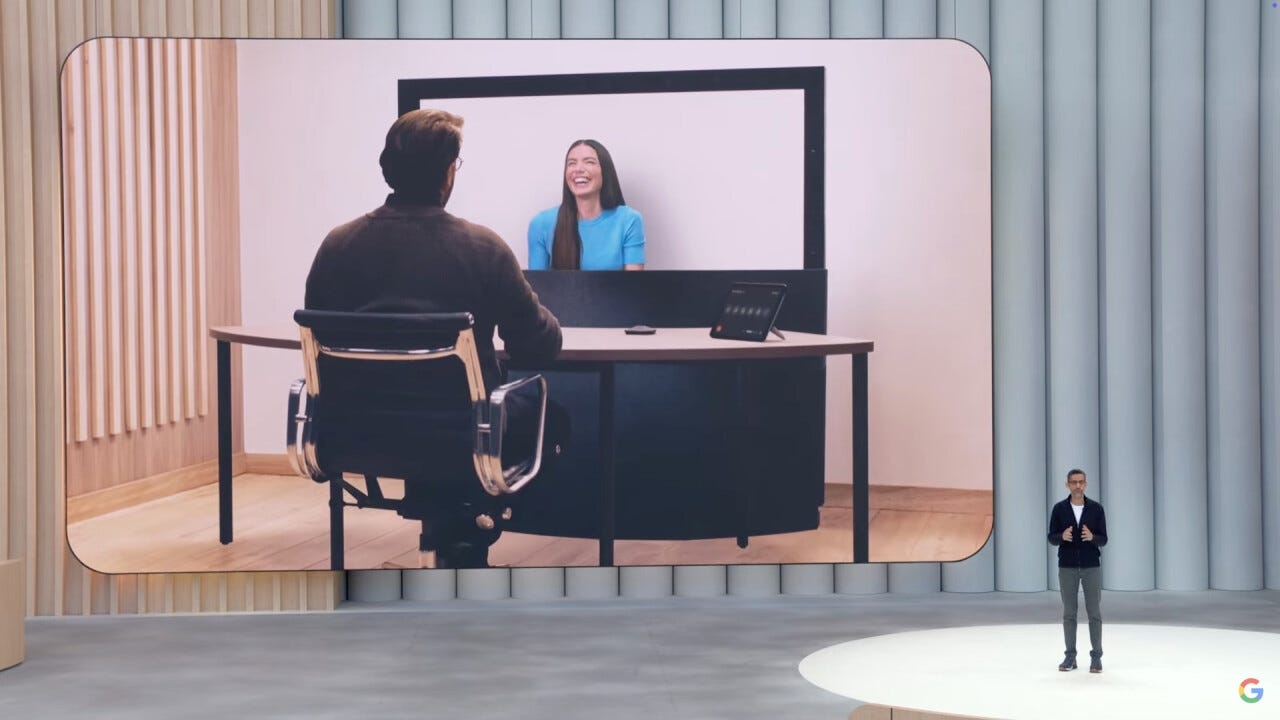News from the IT world
US-China technology trade war, news from Google's I/O 2025 conference, Chinese space-based supercomputer and EU's plan to limit kids' access to social media
US-China technology trade war - latest chapter
There is growing concern that China’s Huawei will soon be selling AI processors in China and foreign markets that can compete with Nvidia and other US companies’ products
The U.S. Commerce Department has warned companies that using advanced Chinese computer chips (specifically Huawei's Ascend AI chips) may trigger criminal penalties.
It said „using Huawei Ascend chips anywhere in the world violates US export controls”, on the basis that they almost certainly contained, or were made with, US technology.
The Chinese Ministry of Commerce first labeled the U.S. actions as "discriminatory" and urged Washington to "immediately correct its wrongdoings".
Yesterday, China’s Ministry of Commerce has warned that any companies complying with US restrictions on Huawei’s chips could face legal action under China’s Anti-Foreign Sanctions Law. They did not specify what penalties might be imposed but made clear that such compliance would be considered a violation of Chinese law.
According to Bloomberg, the U.S. Commerce Department has since changed the wording of its original guidance to remove the “anywhere in the world” phrase.
Sanctions prevent Microsoft Windows to be installed on Huawei laptops
Huawei has officially begun installing its own HarmonyOS operating system on its laptops, replacing Microsoft Window.
The move comes after Huawei’s license to use Microsoft Windows expired in March 2025, and US sanctions prevented the company from renewing it.
This forced Huawei to accelerate the deployment of its own operating system for PCs.
It’s part of a broader strategy to reduce reliance on American technology amid ongoing US sanctions.
The Chinese mobile operating system market is dominated by Android (64% of market share), while Apple’s iOS has 17%, and HarmonyOS has 19% of market share.
EU plans to limit kids’ access to social media and rewamp its famous GDPR
EU moves toward stricter regulation of children's access to social media and revisits iconic privacy law in pursuit of economic growth and regulatory efficiency
An initiative by Greece aims to establish an EU-wide age of digital adulthood, below which minors would need parental consent to log onto social media; so kids could not automatically access popular apps such as TikTok, Instagram and Snapchat.
Beyond the mandatory, built-in age verification and parental control on devices, the initiative also proposes “European norms” to minimize persuasive features in apps. These are designed to raise the appeal of apps and keep users online for longer, such as autoplay and pop-ups.
The proposal to be discussed by EU digital ministers in June also suggests that age verification happen at the level of devices (instead of platforms, such as Facebook, Whatsapp, etc), which companies like Apple and Google will likely object to.
Australia has already introduced some of the world's strictest regulations taking effect from December 2025. They set a minimum age of 16 for social media accounts, with severe penalties for tech companies that fail to comply. France has also passed national legislation to block children under 15 from accessing social media, though these measures are not yet fully implemented.
The EU is also moving to amend the General Data Protection Regulation (GDPR), its landmark privacy law that was previously considered untouchable.
Digital rights groups and EU insiders often praise the GDPR for setting the global standard for the protection of privacy. For many businesses though, it is seen as a symbol of costly, burdensome EU rules.
The proposed changes aim to ease reporting requirements, particularly for small and financially constrained businesses, in response to longstanding complaints about the law’s administrative burdens.
Negotiations on the GDPR in 2012-2016 saw a fierce lobbying fight between Big Tech giants and privacy rights activists. Since the privacy law took effect in 2018, the EU has steered clear of amending it, fearing that it would reignite the lobbying war.
EU officials are also finalizing a separate law to address what many see as original design flaws in the GDPR. The overall goal is to clarify how national data protection regulators cooperate, and to make the law more practical for businesses while maintaining its core privacy protections.
These efforts are part of a broader EU initiative to reduce regulatory burdens and make European businesses more competitive globally.
Republicans want to prevent states from regulating AI
A last-minute added provision into a budgetary bill would prevent states from addressing AI-related issues through their own legislation for a decade
The U.S. House of Representatives is considering „One Big Beautiful Bill Act”, Trump’s proposed budget reconciliation bill for FY 2025.
A provision introduced last minute would prevent states from pursing any law or regulation on AI, unless the purpose would be „to remove legal impediments to, or facilitate the deployment” of AI systems.
The provision has sparked significant backlash from state attorneys general, academic institutions and advocacy groups, who argue it would strip states of their ability to protect residents from potential AI harms and prevent customers’ protection.
The AI industry has been arguing that a uniform federal approach is preferable to a patchwork of state regulations, which they claim could hinder innovation and competitiveness.
However, some US states (for example, New York, California or Colorado) have already been moving toward regulating some of the highest risks of AI in the absence of significant federal guidelines. These laws could become unenforceable if the bill passes.
Announcements at Google developer conference: 3D teleconference tool and new coding assistant
Subjective selection on what your editor found most interesting

Beam (originally called Starline) is a 3D teleconferencing tool that uses a combination of hardware and software to let a user converse with someone as if they were in the same meeeting room.
An AI model converts video from a six-camera array into a 3D rendering. Google claims that Beam is capable of “near-perfect” millimeter-level head tracking.
It will come to „early customers”, like Deloitte, Salesforce and Duolingo later this year.
Google also introduced Jules, an asynchronous coding assistant that integrates directly with the users’ existing repositories.
Jules is powered by Google’s latest Gemini 2.5 Pro model, optimized for software engineering tasks.
It clones the user’s codebase into a secure Google Cloud virtual machine, understands the full context of the user’s project, and performs tasks such as test writing, bumping dependency versions or bug fixing.
Google promises Jules to be private by default: it doesn’t train on users’ private code and apparently user data stays isolated within the execution environment.
Jules is in public beta phase, access is free of charge for five tasks per day.
Sidenote: OpenAI also recently launched Codex, its own coding agent, currently in research preview for paid users.
In contrast with Codex, Jules’s standout feature is its asynchronous operation, allowing developers to assign coding tasks and focus elsewhere while Jules works in the background.
Codex relies on real-time code suggestions and autocompletion.
Project Mariner, first unveiled in late 2024, is Google’s AI agent, competing with OpenAI’s Operator and Amazon’s Nova Act.
As these tools are all in experimental stage, they are prone to mistakes.
Google now says that it updated Project Mariner to run on virtual machines in the cloud, so users can work on other things in the meantime.
Project Mariner is able to complete up to 10 tasks simultaneously in the background.
Gmail will get a smart reply feature: AI will suggest replies to the emails; it will be launched apparently in July.
More details on all announcements here or here.
Despite available AI tools, humans still needed
After introducing chatbots and firing humans, Klarna now wants humans back
Swedish ’buy-now-pay-later’ company Klarna is reversing course after replacing customer service employees with AI.
Klarna laid off workers and paused hiring in 2023, while touted its newly introduced AI chatbot as a cost-saving success.
The company claimed AI could handle the workload of 700 humans and helped save $10 million in marketing expenses.
However, Klarna CEO now admits the company may have gone too far. While AI offers speed, it lacks the empathy and nuance that human agents provide, resulting in lower quality work.
Klarna is now planning to reintroduce human customer service agents, but in a gig-style model—similar to Uber—where workers can log in and out as needed.
AI in space: China wants to create the world’s first space-based supercomputer
This project is a major technological leap to create real-time, in-orbit data processing
China has launched the first 12 satellites of a planned 2,800-strong orbital supercomputer satellite network, known as the “Three-Body Computing Constellation.”
The satellites communicate with each other using high-speed laser links at up to 100 Gbps and share a total storage capacity of 30 terabytes.
This network is allegedly designed to process data directly in orbit, eliminating the need to send raw data back to Earth for analysis.
Experts point out that this mega-constellation could also serve other purposes and support the rapidly increasing (and very secretive) Chinese military space program.
Human trafficking victims forced to run AI-powered scam operations
If you think your work is difficult.... think again
Young tech workers from Indonesia, China, Ethiopia, India, and other developing countries are being lured by fraudulent job ads on Facebook, Telegram and other social media platforms.
These ads typically promise legitimate IT or online sales jobs abroad.
Applicants are taken to fortified scam compounds along the border of Myanmar, Cambodia, Laos and in the Philippines, run by Chinese criminal syndicates.
Upon arrival, applicants have their passports and phones confiscated, and they are coerced into scamming people worldwide.
Workers speak to victims on social media using AI-enabled tools that generate deepfake videos in real time.
These farms earn about $40 billion in profits every year. Americans alone lost $12.5 billion in 2024, mostly to investment scams, according to the U.S. Federal Trade Commission.
And finally: got enough of GeoGuessr*? Try OpenAI’s global competition to uncover lost or unknown archeological sites
The OpenAI to Z Challenge is a global, open-ended competition launched by OpenAI.
It invites participants to use its AI tools—specifically OpenAI’s o3/o4-mini and GPT-4.1 models—to uncover lost or unknown archaeological sites in the Amazon Rainforest.
Competitors should use open-source data (e.g., satellite imagery, colonial diaries, etc.) to identify potential archaeological sites within the Amazon biome.
The top five teams will present their findings in a livestreamed event.
* GeoGuessr is a browser-based geography game in which players must deduce locations from Google Street View imagery.






